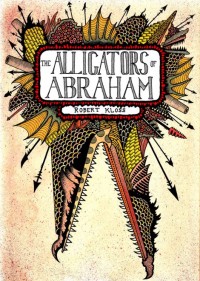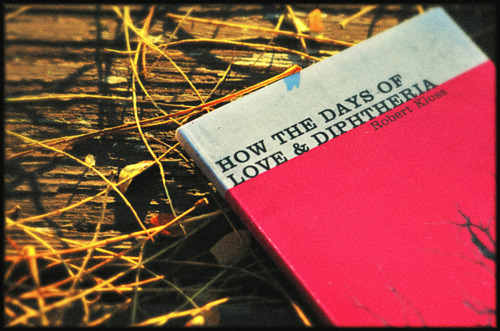The Desert Places
 The Desert Places
The Desert Places
by Amber Sparks and Robert Kloss, illustrated by Matt Kish
Curbside Splendor Publishing, 2013
84 pages / $10.60 buy from Amazon
Rating: 8.5
Evil is ubiquitous. It’s in the best literature and (as I present it to my students) it is the reason why humanity needs literature: as relief from evil and as elucidation for evil. The Desert Places, the new hybrid text by Amber Sparks and Robert Kloss, with illustrations by Matt Kish, depicts the history of malevolence from primordial Earth all the way into a nightmarish technological future. Plenty of other narratives have depicted the fall and subsequent struggle of Lucifer, Chamcha, Grendel, et al., but what sets Sparks’s and Kloss’s narrative apart is its broad scope within such a slim package. READ MORE >
October 17th, 2013 / 6:06 pm
25 Points: The Alligators of Abraham
 The Alligators of Abraham
The Alligators of Abraham
by Robert Kloss
Mud Luscious Press Novel(la) Series, 2012
214 pages / $15 buy from SPD or Amazon
1. Alligator: Non-commissioned submarine, completed Spring 1862 by Union Navy. Length: 14.3m. Speed: 2-4 knots. Crew: 8. Missions: Five, failures. Abandonment: Its tow ship, the U.S.S. Sumpter, cut it loose during a storm off Cape Hatteras, NC. Remains lost.
2. Abraham Lincoln visited the Alligator during its testing phase. Brutus de Villeroi’s initial design required paddle propulsion, which was later replaced by a central screw propeller.
3. (The American Annual Cyclopedia and Register of Important Events of the Year 1891): “One steamer, the ‘Louvre of Paris,’ was built and put on service [using a central screw] between Paris and London. She made a very good record for herself for nearly a year, but was unfortunately wrecked, through no fault, however, of her peculiar construction.”
4. When the alligators finally appear and begin devouring people about halfway through RK’s novella, I did one of those disorienting Google/library searches on whether a plague of alligators really followed the Civil War anywhere in the coalescing Union. I found the Alligator instead, and I couldn’t separate it from the flesh gators in the book. A plague of hungry submarines.
5. Matt Kish’s drawings are toothy reptilian sprawls of overlapping flesh and machine, gaping mouths in the process of being perfected.
6. The General, Alligators of Abraham’s marauding patriarch, shifts his bloodlust, augmented by grief over a son dead from typhoid and a suicided wife, into (self-)mutilating industry. Into a necrophilic fixation on embalming his body while still alive, and living inside the bloated corpses of alligators. Into pathetic need: “I need you here by my side. I fear I may destroy us all” (to his second son, after a second wife has left him). Into merging his sons’ identities, never naming the composite dead/alive child he (and the book) regards as you except to call him by the dead boy’s name, Walter.
7. Old Testament-fueled American novels of war rage relegate women to drawing rooms, brothels, graves, sanitariums, rumors, away. The second wife inspects a private room the General has customized for her, and says to son and husband, “Will the both of you just leave?” As if I can’t be in this room if you’re watching. And after she has packed and gone, the General says to his son, “If she weren’t gone already, I would kill her.”
8. “And your father lit kindling beneath his tin tub while infant alligators darted within, and soon the slow boil of water, and your father said into the absence, ‘I believe their hide impervious.’ And when these alligators bobbed lifeless in the bubbling, your father said, ‘They must become stronger with time.’”
9. (This Republic of Suffering: Death and the American Civil War): “Redemption and resurrection of the body were understood as physical, not just metaphysical, realities, and therefore the body, even in death and dissolution, preserved ‘a surviving identity.’ Thus the body required ‘sacred reverence and care’; the absence of such solicitude would indicate ‘a demoralized and rapidly demoralizing community.’ The body was the repository of human identity in two senses: it represented the intrinsic selfhood and individuality of a particular human, and at the same time it incarnated the very humanness of that identity—the promise of eternal life that differentiates human remains from the carcasses of animals, who possess neither consciousness of death nor promise of either physical or spiritual immortality. Such understandings of the body and its place in the universe mandated attention even when life had fled; it required what always seemed to be called ‘decent’ burial, as well as rituals fitting for the dead.”
10. Nobody in this book is decent. READ MORE >
February 12th, 2013 / 2:21 pm
All of My Desire to be Involved: An Interview with Robert Kloss

Robert Kloss is the author of How the Days of Love & Diphtheria (Mud Luscious Press/Nephew) and The Alligators of Abraham (Mud Luscious Press, 2012). He is found online at rkbirdsofprey.blogspot.com.
Jackson Nieuwland: This is my first time being a ‘real’ interviewer. I’ve interviewed people before but they were pretty close friends of mine and I just posted the conversations on my blog. I don’t know you that well and hopefully this interview will be published somewhere cool. I enjoy interviewing, the finished product often feels like a significant achievement. I’m going to try and continue with my personal ‘style’ of interviewing here by asking you questions in bunches to be answered together and putting myself into the interview a bit (you are encouraged to ask me questions if the urge takes you). Have you been interviewed before? Have you interviewed people before? Do you have any interest in the artform of the interview? Do you read many interviews? What sorts of interviews do you prefer? Text? Audio? Video? What are your thoughts on each medium? Have you watched any of Nardwuar’s interviews? Do you have any favourite interviewers? Do you have any favourite interviewees? Are there any types of questions you particularly like or dislike?
Robert Kloss: I’ve interviewed a few people but I never really felt too comfortable with the process. It was fun and the writers I interviewed were very good to give their time and thoughts, but I don’t know that I had a knack for the form. I think a good interviewer is curious and is open to a certain process of discovery and I’m afraid I’m just not a very curious person. And, when it comes to people, I’m at the opposite of curious–the thoughts and particular cares or wants of a certain person just aren’t interesting to me anymore. So I don’t read or watch too many interviews. I don’t even read the letters or journals of famous writers anymore. Even if the conversation is profound (and they rarely are) I’m not sure I get much out of it. It wasn’t always like this. I used to watch Charlie Rose, for instance, because I was interested in World Figures. And I used to read interviews with filmmakers and composers and writers I admired. But I’m just not terribly curious anymore. That said, there are some people, some writers, who take the interview and turn it into a real art, a sort of extension of their work, and I do find that interesting/readable. Partly because I’m new to the idea of presenting myself to the wider world, and shaping that image in a certain way. But partly because while the mundane thoughts and opinions of some stranger aren’t terribly interesting, that stranger’s art probably is. I feel like any writing worth much is a reflection of the truest part of the writer anyhow so why shouldn’t the writer present themselves as what they are, a reflection of their art? READ MORE >
